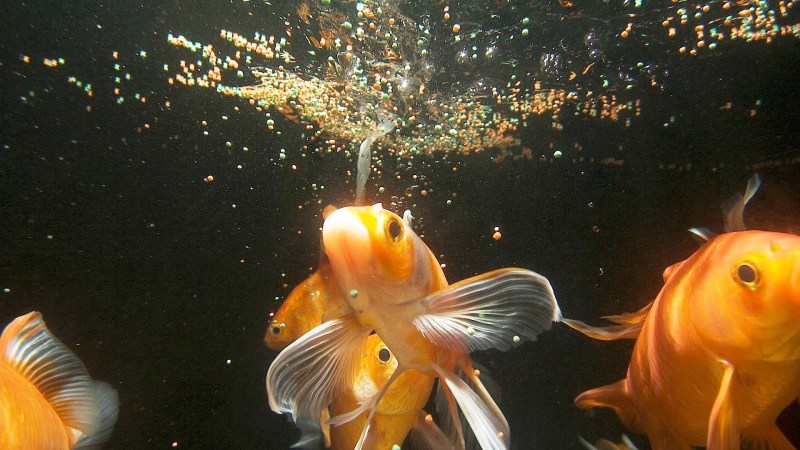What To Do With Fish While On Vacation – Going on vacation is something we all want from time to time, but for aquarists, leaving their fish tanks and aquatic pets behind can be a daunting prospect. While the challenge of making sure the fish are taken care of is common during the holidays, misunderstandings about how the fish will fare in your absence are often a source of concern. Whether you have a saltwater aquarium with fish and freshwater plants or corals and other invertebrates, this comprehensive guide has you covered.
In this article, we’ll cover the basics of caring for your aquarium fish, plants and/or invertebrates when you’re away from home. From understanding the basics of fish care to vacation preparations, solutions in your absence, and additional considerations for freshwater and saltwater aquarium care, we’ve got you covered. By the time you finish reading, you’ll have the knowledge and confidence to put your aquatic ecosystem in good hands and enjoy your vacation worry-free.
What To Do With Fish While On Vacation

Before considering specific holiday care, it’s important to understand the basic needs of your aquarium’s inhabitants, whether it’s freshwater fish and plants or saltwater corals and invertebrates. These conditions include regular food, clean water and a stable environment. Neglecting any of these essentials can lead to stress, illness and even death among aquatic friends.
How I Make Diy Vacation Fish Feeders! 🙂 ✈️🐠 #fishtok
Freshwater aquarium fish require specific water parameters and compatible partners. Here’s a closer look at the basics
Regular feeding is essential to the health and well-being of freshwater fish. Different species have different nutritional requirements, so research and providing the right food is essential. Drinking too much can cause water quality problems, so achieving the right balance is very important.
Maintaining clean water is perhaps the most critical aspect of freshwater aquarium fish care. Filtration systems help remove debris and maintain water quality. Regular water changes are also essential to remove harmful substances and excess nutrients while replenishing essential minerals.
Freshwater aquarium fish are sensitive to changes in their environment. Factors such as water temperature, light and water chemistry must remain constant to avoid stress and health problems.
Excellent Fishing Through June…….and That’s A Wrap!
Saltwater aquariums, especially those with corals and invertebrates, require close attention due to their delicate nature. Here’s what you need to know:
It is very important to maintain a stable water chemistry in a saltwater aquarium. Corals and invertebrates are particularly sensitive to pH, calcium, alkalinity, nitrate and phosphate levels. Regular water testing and supplementation are essential to their care, whether indoors or outdoors.
Corals and many invertebrates in saltwater aquariums depend on adequate light for photosynthesis and growth, so it’s important to make sure your bulbs (if you’re using T5 or metal halide) aren’t so old you need to replace them before the holidays. your With LED lighting, it’s not as important, but make sure the light is working properly before you leave.

Saltwater aquariums must maintain acceptable temperature and salinity levels, so turning off the air conditioner mid-summer is not an option if you live in a hot climate. Alternatively, you can invest in quality heaters from brands such as Finnex or Innovative Marine. Having a connected fridge and aquarium controller to monitor, control and dose additives while you’re out and about is also a great investment.
Feeding Aquarium Fish While On Vacation
Whether you have a saltwater aquarium with fish and freshwater plants or corals and invertebrates, neglecting these basic aspects of fish care can have dire consequences if you are not prepared in advance. Now that we understand the importance of these basics, let’s move on to how to ensure the well-being of your aquarium during the holidays.
Ensuring the well-being of your aquatic inhabitants while you’re out and about is a priority. With the right steps, you can enjoy your vacation without worrying about your aquarium
Before going on vacation, whether it’s a freshwater or saltwater aquarium, regular tank maintenance is essential. This includes cleaning the aquarium and checking all equipment to make sure it is working properly. Cleaning the tank not only keeps it visible, but helps maintain water quality by removing debris, debris or unwanted algae growth.
After maintenance, spend some time observing the inhabitants of your aquarium, be it fish, plants, corals or invertebrates. Make sure they are behaving normally and healthy. Signs of distress should be addressed immediately, as unresolved issues may worsen in your absence.
Learning To Fish With A Hand Reel On Groote Eylandt
A common misconception among aquarium owners is that they have to overfeed their aquatic friends before going on vacation. The idea is that it will keep the extra food in the owner’s absence. However, overfeeding can cause water quality problems as uneaten food decomposes in the tank, producing harmful substances such as excess nitrates and/or phosphates.
Instead of overeating, it is better to rely on the right nutritional solutions in your absence, which we will discuss in the next section.
When it comes to feeding your aquarium inhabitants while you’re away, there are many options to ensure they are properly fed without compromising water quality.
:max_bytes(150000):strip_icc()/watering-plants-while-on-vacation-1402425_Hero1-63d0960af2924f7eba36974eda6ffb45.jpg?strip=all)
Holiday diets consist of breaking down food blocks designed to slowly release food over a period of time. These blocks can be a convenient alternative for short breaks in freshwater and saltwater aquariums. However, their effectiveness may vary depending on water conditions. In high-flow tanks, they may dissolve too quickly, causing overfeeding, and in low-flow tanks, they may not dissolve enough. Also, they can sometimes cloud the water and some fish may not adapt to the type of food that contains these nutrients. If you’re not sure, try this type of food while you’re at home to see how your fish and tank react.
Different Ways To Fish While On Vacation
Automatic feeders such as the Eheim Everyday Feeder or the Lifegard Intelli-Feed are a reliable and versatile solution for long breaks in freshwater and saltwater aquariums. These devices deliver a specific amount of food at a specific time. Before you leave, install and test your automatic feeder to make sure it’s working properly. Use high-quality nutrients with settings that can be tailored to the nutritional needs of your aquatic inhabitants. There are several brands of automatic feeders on the market, some of which connect directly to an aquarium controller, such as the Neptune Systems Apex platform or CoralVue Hydros.
Investing in an automatic fish food dispenser is the first step to a worry-free vacation. These devices are designed to deliver controlled portions of food at regular intervals, mimicking a normal eating routine at home. Here’s how to get the most out of them:
Hire a fish or aquarium maintenance company: If you have a friend or family member who knows how to take care of an aquarium, have them go and check on your fish. They can also provide manual feeding from time to time for automatic feeding, as well as ensure that the aquarium equipment is working properly.
If a discerning hobbyist isn’t an option, consider contacting a reputable aquarium service. Yes, there is a cost associated with this, however an aquarium business can do water changes, water tests, cleanings and make sure everything is running smoothly.
Sea Robins: Trash Fish No More!
Having raised both saltwater and freshwater fish for over 40 years, I recommend using an aquarium service company. This creates some liability if something goes wrong while you are away. Asking a friend or family member to be responsible and accountable is not only a conflict of interest for both parties, it can destroy a good relationship in the process.
Contrary to popular belief, some fish and other aquarium inhabitants can go without food for long periods of time without harm. Many fish species have evolved to cope when food is scarce in their natural habitat. Therefore, a well-nourished aquarium ecosystem can usually go without food for several days or more without much problem. But, this is not always the case with fish that need daily feeding. such as the salty species of anthias.
Understanding the unique needs and limitations of your aquarium inhabitants is critical when traveling long distances. Be it freshwater or saltwater species. Find out about the control requirements of the one you are interested in. Some species are hardier than others and factors such as water temperature and available resources can affect their ability to fast.

Your aquatic friends depend on a stable environment, especially when you’re not around to make immediate adjustments. Here’s how you can make sure they keep growing in optimal conditions.
🎣 Did You Know You Can Add Bottom Fishing To Your Private Excursion? 🌊 While #caicosdreamtours Doesn’t Do Deep Sea Fishing, You Can Still Enjoy A Fantastic Experience With Our Local Captain And Crew
Maintaining a stable day-night cycle is critical to the well-being of most aquarium inhabitants, whether it’s freshwater fish and plants or saltwater corals and invertebrates. Consider using timers for your aquarium lights to ensure your aquatic ecosystem has a regular light-dark cycle even when you’re not there. At least we use light timers for our freshwater systems and reef aquariums. And many of our reef tanks are used with aquarium controllers.
Consistent water temperature is essential to the health of both freshwater and saltwater aquariums. Depending on the time of year and location, you should take precautions to avoid temperature fluctuations.

